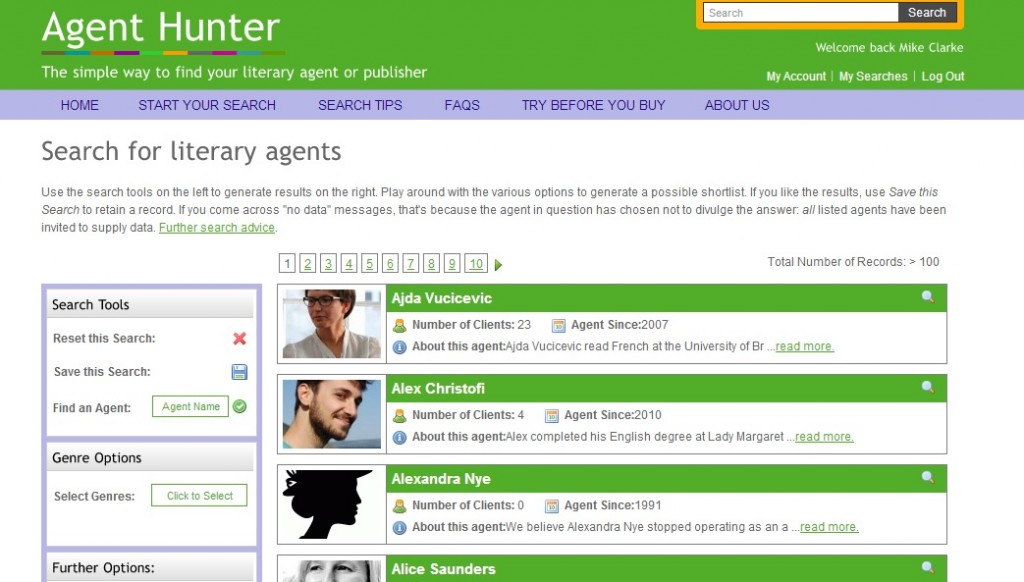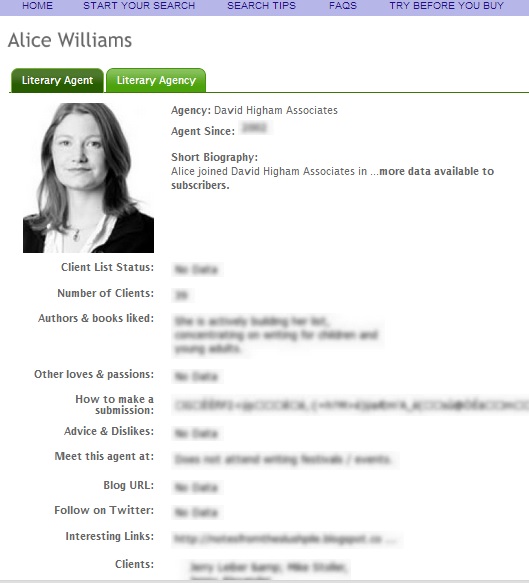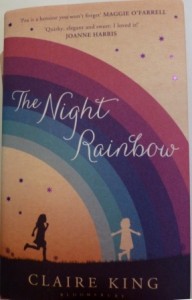It’s been so long since the last post I’ve taken inspiration from the chiller at the end of the aisle in my local Tesco and have produced three posts for the price of one.
Last Saturday night, primed after a few pints from the local pub, I joined the annual British tradition of watching the Eurovision Song Contest.
Nowadays this appears to be a ‘game of two halves’ affair. When the performers gamely take the stage, we indulge in the finest British tradition of thoroughly taking the piss, especially of the self-deluded countries that appear to take the competition seriously. But we’re often dumbstruck when some of the acts are so bizarre they rise above irony.
Among the general cheesiness this year was an apparent theme of giants — including a towering vampire giant from Romania — and a bizarre song from Greece called Alcohol is Free – if true then then it sounds great place for a couple of weeks in the summer. (Perhaps it’s to try and convince the Germans of the merits of their economic model?)
The second half of the show is like a hangover. All our European friends get their own back on all our withering sarcasm by apparently voting in concerted geo-political alliances which have the ultimate aim of making sure the Royaume Uni comes last – although this year, reflecting Euro tensions maybe, the Germans received the same kicking.
Like most parties, it’s a good idea to leave well before the end.
And we’re not just limited to using our own sparkling wit to complement Graham Norton’s (who maintains the peculiarly British Eurovision tradition of having an Irishman to cheer-lead the devastating put-downs). In the age of social media we can exchange our banter real-time in cyberspace in real time in a national Twitter bitchathon. Some academic could probably establish a correlation between retweeting and favouriting and the flow of booze as the night wears on.
Once, like some of the newer European countries, we seemed take the Eurovision Song Contest seriously – or maybe it’s just that I was child (just about) when the likes of Bucks Fizz and, earlier, the Brotherhood of Man actually won the thing.
Could it be that the Tory party’s neurosis over Europe can be directly traced to when the foreign Johnnies spurned Cliff Richard’s Congratulations — and, even worse, when we gave them a chance of atonement when he tried again with Power to All Our Friends?
And suspicions over our continental cousins would have been kindled when they failed to be seduced by the charms of our own Olivia Newton John. So what if she actually came from Australia? Before her fall from grace as Sandy in Grease and her raunchy Physical phase Olivia was very much the kind of girl next door beloved by the swivel-eyed loon community, albeit from 10,000 miles away.
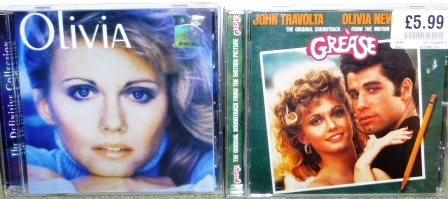
For a period its popularity seemed to be waning – you can’t imagine the Britpop types of the 90s giving Eurovision more than a post-ironic ‘f*** off’ – but Eurovision has undergone the same renaissance as many other re-invented guilty pleasures. Who’d have ever thought ELO would become über cool?
Is it because, to the annoyance of some, that we’re far more integrated into Europe and the British lifestyle has become more comfortably continental?
Or, does the Eurovision Song Contest, amongst the uncool crooners and ubiquitous camp dancing, offer rare nuggets of unbridled eccentricity and uninhibited spontaneity – exactly the type of entertainment that’s normally lacking from prime-time Saturday night schedules?
I don’t watch vast amounts of the likes of the X-Factor, The Voice or Britain’s Got Talent (the novel-writing takes care of that) but I’ve seen enough to know that ‘success’ (at least in the first two of those programmes) is dependent on conformance to rigid stereotypes.
Simon Cowell and his ilk have condensed the music market into reliably marketable categories: the soul diva; the guy next door with that twinkle in his eye; the sassy girl-power group or the boy band with cheeky/smouldering/six-packing members (clichéd descriptions, I know, but that’s the point).
While it’s true that most music is marketed using less overt but equally cynically derivative formula, these stereotypes are particularly fail-safe. The distinction between successive years’ talent show winners are often of a similar magnitude to the great technological innovations that are emblazoned on the packaging of toothpaste or dishwasher tablets – a load of powerballs.
Nor do The X-Factor’s less manufactured rivals provide a feast of musical originality. The likes of Emili Sandé or Adele produce very competent and well-crafted albums and the bands like Coldplay can work a stadium along with the best of them (who are probably still the ancient Rolling Stones). But none of their work is likely to confound the expectations of their fans.
(This isn’t to say I dislike any of these above artists as I’ve bought CDs by all of them – yes, CDs show I’m old-fashioned enough to actually still buy music).
What tends not to succeed with these formulae are the qualities of imagination, eccentricity inventiveness and experimentation, the lack of which may explain the phenomenal popularity of the current David Bowie Is exhibition at the V&A Museum. Bowie’s even on the cover of next week’s Radio Times. (There’s a programme about Bowie’s most significant five years on BBC2 tonight (25th May) – which I’ll probably watch after exchanging messages with my German friend Thomas about the all-German Champions League final at Wembley.)
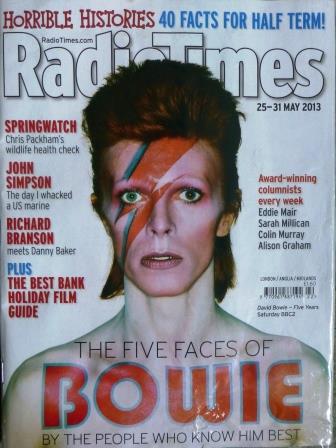
I’m not a mega Bowie fan but I learned my lesson from failing to get a ticket to the V&A’s recent Hollywood exhibition so booked early (tickets went very quickly) and managed to spend a lunchtime there last month.
It wasn’t nearly long enough – it would be easy to spend an hour or so just watching the concert footage. I compensated by buying the big, heavy show catalogue – for which my groaning bookshelves won’t forgive me.
From the point of view of plugging away for years at my own creative endeavour, it was reassuring that the exhibition started with the efforts of Bowie and his record companies to persist in trying to breakthrough commercially in the late 60s – something often forgotten in career retrospectives.
Bowie spent around five years on the fringes of Swinging London (from the famous 1964 BBC Tonight long-hair interview) until Space Oddity established his reputation, commercially timed to coincide with the Apollo moon landings. (Oddly, I didn’t see any references whatsoever to The Laughing Gnome throughout the exhibition.)
That so much of the material came from his personal archive also showed how assiduously Bowie has curated his own artistic legacy.
The V&A show displays many Bowie stage costumes. Viewed close up, some of the outfits look less like iconic images than home-made fancy dress costumes. But these were an essential part of Bowie’s distinctive appeal as he underwent style makeovers at a dizzying pace, especially in the early 70s, changing from Ziggy Stardust to Aladdin Sane and so on. That’s one era that I’m fortunately too young to remember properly, although I do recall my uncle, a student at the time, showing my dad the cover of Diamond Dogs – to which the response was something like ‘What the bloody hell is that?’
Worth the entrance fee alone, particularly as a piece of social history in the week when a gay marriage bill has gone through the Commons, is the hilariously caustic Bernard Falk film for BBC Nationwide which is played on a loop in the exhibition. Dating back to 1973 it spits studied disgust at Bowie’s androgynous gender role-play. It’s well worth clicking the link to watch it on YouTube.
‘David Bowie spends two hours before his show caressing his body with paint…a bizarre, self-constructed freak…it is a sign of our times that a man with a painted face and carefully adjusted lipstick should inspire adoration from an audience of girls aged between fourteen and twenty…he will earn around half-a-million pounds this year [so] he can afford a personal make-up artist to cover his nails in silver.’
Being too young to follow Bowie’s reinventions at the time and his withdrawal (literally from drugs — his cocaine spoon is in the exhibition) and renewal in his Low period and the Berlin years, I found this an interesting section of the exhibition, especially as I like the city myself.
The first Bowie record I bought was, I think, Ashes to Ashes (that video is very peculiar), followed by Catpeople (both versions are brilliant), the weird Baal EP and the commercial Let’s Dance (I love Nile Rogers’ work from the late 70s to the mid 80s).
The videos for some of Bowie’s greatest tracks can be viewed alongside the original costumes and his own handwritten lyrics. These fascinate me. It’s an amazing experience to read lines like ‘Sailors fighting on the dancefloor, Oh man, look at those cavemen go,’ in the writer’s own hand, hearing the words sung simultaneously. Maybe it’s because I have the mind-set of a writer but I venerate these pieces of handwriting like religious artefacts (as I did viewing handwritten drafts by the likes of Jane Austen, Hardy, Eliot and J.G. Ballard at the British Library last year).
Reading Bowie’s own handwriting I realised this was the first time I’d actually fully understood many of his lyrics – especially lines like ‘strung out on heaven’s high’.
The strange juxtapositions that are a feature of Bowie’s lyrics were partially explained by an exhibit about the ‘Verbasizer’: a computer program he commissioned to randomly assemble fragments of sentences that had been fed into it . Bowie trawled the output for interesting combinations that he could develop further – maybe a useful tool for a poet or fiction writer?
I can’t agree with those who say Bowie was the most significant popular musician of the late twentieth century. However, his creation of enough artefacts to sustain a show at the V&A demonstrates, perhaps, his approach of constant re-invention and challenging of the audience through playing with the persona of the pop star meant that he was uniquely pivotal in developing the interaction between popular music and visual art.
In doing so, he created some beautiful music – I always think the ending of Ashes to Ashes is one of the most exquisite passages of popular music. Bowie was also shrewd in working with some great collaborators. They contributed hugely to the sound of the Zeitgeist of the time– for example Rick Wakeman’s haunting piano on Life On Mars and the work of Mick Ronson (who worked as a council gardener in Hull immediately prior to being one of the Spiders from Mars), Iggy Pop, Tony Visconti and many others.
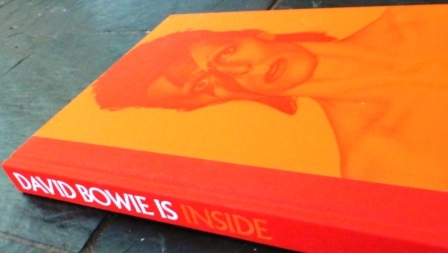
The contrast between the Bowie’s rip-it-up-and-start-again approach and the industrialisation of the X Factor wannabees is also perhaps applicable to the experience of the aspiring writer. The goal is similar – to impress the judges – agents, publishers, booksellers – who can metaphorically allow their work to proceed to the next round, etc.
While some are happy to write for themselves and a limited audience, the majority of writers seek their work to be read by as widely as possible. The motivation might be very similar, in a quiet bookish way, to the attention-seekers on TV talent shows – having your name on the cover of a book on sale in a shop must be immensely gratifying, even more so after the long, lonely slog of writing a novel. On a more personal level, I’m sure most writers get an ego buzz when someone says they’ve enjoyed reading their work – why workshopping writing can be stressful – will you get a high of approbation or a low of ‘this didn’t really work for me’?
It’s likely there are more people who aspire to be novelists than join the next One Direction. While it probably wouldn’t be very televisual to film a show with hopeful writers auditioning their prose, which would probably vary between execrable or surprisingly good, it would still be compelling, competitive drama.
In the meantime, there’s no shortage of writing competitions or other forums in which writers can offer up their work for the judgement of others (writing groups, creative writing courses, etc.). Having taken many writing courses and kept in touch with quite a wide network of writer friends, both physically and online, I’ve had plenty of experience of having my own writing critiqued. I’ve also critiqued a lot of other people’s writing in return.
I like to think that I try to offer feedback by suspending, as much as possible, my own preferences and to assess whether the writing achieves the objectives with which its author set out (as far as these can be discerned). But I had an experience last week that made me wonder if I’d been swallowed up by the great ‘rules of creative writing’ homogenising machine.
A new friend who’s a writer sent me the opening of a book she was working on. It was very compelling, although I’d annotated the manuscript with quite a few notes for feedback. She’d also read the work to a writers’ group she’d recently joined and had sought the opinions of other writing friends.
We met up for a chat and when I mentioned various points that had occurred to me about the writing – like the narrative arc, scene-setting/chronology, point-of-view, intertwining of detail and back story – she invariably said ‘That’s really useful as the writers’ group said that too’ or ‘That’s exactly what my friend said’.
This was quite reassuring for her – and in some ways for me – because if my suggestions were similar to those of other people I’ve never met then my comments weren’t the ramblings of a lone, self-opinionated eccentric.
It’s likely that these other reviewers were influenced by the same courses, books/magazines on writing, conferences, agent talks, blogs, Twitter, etc. And this means that our collective perspective probably largely coincides with the general views of the professional ‘judges’ of writing: agents, publishers, editors and so on.
But, to return to the previous musical comparisons, do these universal truths mean that following these collectively-held writing axioms is more likely to shape a literary Joe McElderry than a David Bowie?
While conscientiously workshopping one’s writing is likely to purge the equivalent of cheesy, lame Eurovision entries, the tendency for writing groups to search for consensus might also dismiss the mad, off-the-wall eccentricities that are comparable to what makes the song contest’s unique appeal.
My Twitter friend, Pete Domican, makes some good points on his recent update to his blog entry about his decision to avoid buying from Amazon, which is well worth a read.
One of the points he makes in favour of using specialist bookshops is the serendipity of finding the unexpected: ‘I want to find books on a shelf that I’d have never discovered otherwise… I want to have conversations with writers who write ‘weird’ stuff…’
There’s so much advice aimed at making writers’ work stand out in the slush pile that its truisms are almost ubiquitous – and the focus is usually on trying to reduce the risk of making mistakes. It’s tempting to think that this might encourage a general shift towards the formulaic although there are certainly plenty of books published that don’t follow The Rules (probably by writers lucky enough to attract attention who have either avoided the traditional sources of advice (or deliberately contradicted them). And established writers potentially may feel freer to experiment.
Given last Saturday’s reaction from my ex-City university writing group friends to the latest section of my novel, I probably don’t have to worry too much about my own writing being over-homogenised. I was asked ‘Do you put these things in to deliberately get a reaction out of us?’ The answer is that I don’t (although I did slip in one line for that purpose in last week’s extract). It appears my novel is quite capable of setting off lively debates and reaction without any pre-meditated intervention – which I think is probably a good thing, on balance.
While I read a great deal and try to do more if possible, the necessity of grabbing bits of spare time to write my own novel means I don’t get time to get through nearly as many contemporary novels as I’d like – I’d love to get through a fraction of the number of new novels as does another Twitter writer friend, Isabel Costello.
Isabel’s blog, On the Literary Sofa, features many of her reviews of recent and forthcoming novels. The latest post lists her top ‘10’ summer reads (worth visiting, not least for the chance of winning one of the books). I noted that the majority of the titles, which on first impression seem to sit around the ‘sweet spot’ between genre and literary fiction, were set overseas, particularly in North America and South Africa.
The interesting location of the novels reflects the importance of setting to a reader – using a novel to imagine oneself transported into another world is a fundamental attraction of fiction. What Isabel’s list doesn’t appear to feature heavily is the ‘high concept’ novel.
‘High concept’ is about trying to make a novel sound completely unique – particularly when reduced to a one or two sentence ‘elevator pitch’ – and according to a lot of advice I’ve read or heard, the more quirky or intriguing the concept the better – they often involve devices like memory loss, manipulation of time, improbable challenges and so on. But, paradoxically, when an increasing number of successful novels are evidently constructed around some kind of attention-grabbing concept then the need for a similar hook starts to become another essential item on the how-to-get-published checklist.
I’m currently reading a novel in which the prose is wonderful, the main character is sympathetic and credible and the author is adept at using difficult technical skills, such as dropping in backstory that anticipates readers’ questions that have been subtly raised. It’s also constructed around an obviously whimsical, quirky concept. While the concept works as a device in giving momentum to the narrative arc, I’m already becoming quite exasperated because it also seems to stretch the plot’s credibility past breaking point. It also requires the author to address otherwise unnecessary details that result from trying to sustain the central premise.
The book has clearly worked commercially and I’m sure I’m particularly curious about the techniques used to structure a narrative. However, I wondered if it had started as a ‘quiet’ book, concentrating on character-related development, and had the concept reverse-engineered into it. I may be completely wrong – the hook may have sprung into the writer’s mind before the rest of the novel but I it will be interesting to see the approach the author takes with her next book.
Like most such fashions, hopefully the primacy of high concept ideas will pass as, while it helps make a great pitch to a Waterstones buyer, ultimately the reader will suffer if writers of sympathetic and intelligent books feel the incorporation of some over-arching novelty is a pre-requisite for publication.
Having cited David Bowie as an example of rule-breaking and diversity, some might argue his approach to showmanship is in the spirit of high concept. In the case of Bowie as an individual artist, this is probably true. However, a truer analogy with writing advice would have resulted in every aspiring singer in the mid-70s to be told the way to success was to ape Bowie and re-invent elaborate personas for each album. To some extent this happened with prog-rock (remember Peter Gabriel dressed as a flower?) but what swiftly followed was a huge two-fingers being given to this prevailing orthodoxy: punk.
I recently read John Lanchester’s Capital, partly because it has some genre similarities with my own writing. I had high expectations for the novel. These weren’t wholly fulfilled but I admired the book’s ambition and the way it contradicted much of the received writing wisdom.
The ‘ultimate question’ asked in courses and workshops about a novel is usually ‘whose story is it?’. Capital can’t answer this – there are well over half-a-dozen characters who share equal prominence. And it’s not the story of Pepys Road (in south London, nominally where it’s set) either because there’s no real connection between the characters apart from vague demographics – some don’t even live there. There are also many sudden POV shifts, a large amount of exposition by ‘telling’ and there isn’t much of a narrative ‘chain of causality’.
Some of Capital’s characters work better than others but, as a reader, I’d rather Lanchester attempted the diversity of writing from the perspective of a female Zimbabwean parking attendant or a character innocently caught on the fringes of religious extremism than to stick with what seems the safer, more comedic territory of the disillusioned banker or football club fixer.
The book similarly varies in tone – ranging from terminal illness through the sexual motivation of Polish builders to the topical humour of an irredeemably consumerist banker’s wife. But I can imagine a writer being given advice on pitching a similar novel ‘but what is it – a romance, a comedy, social commentary’?
Like Eurovision and Bowie, Capital defies easy categorisation, and should be admired for that because if a ‘rules of the X-Factor’ approach is over-rigorously applied then we’re in danger of losing the serendipity and variety of the eccentric and individual that provide genuine surprise and delight.

